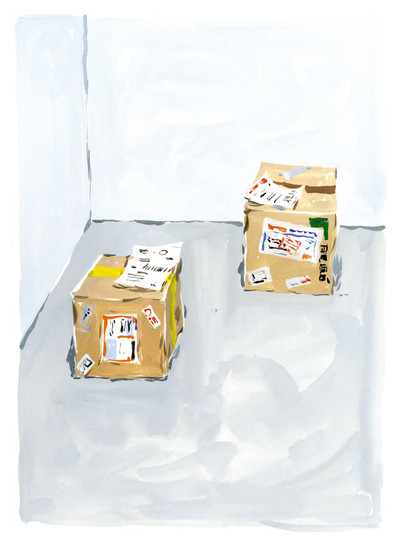The key to success in Chinese e-comm? Do-it-yourself, buy-it-yourself.
By Hung Huang
Illustration by Jean-Philippe Delhomme
The key to success in Chinese e-comm? Do-it-yourself, buy-it-yourself.

I had a store called Brand New China, a boutique which sold mostly Chinese designer products. Finally, the rent got too high for us to bear, and as millennials, our main customers, do 40 percent of their shopping online, it was time to close the physical store and go digital.
Taobao, the Chinese equivalent of Amazon or eBay, and part of the now world-famous Alibaba, leads the online market, but now there are several other must-occupy platforms alongside it. JD.com, the second largest e-commerce platform in China, has made a huge splash in the market for luxury fashion here, hosting shows of Chinese designers at Milan Fashion Week. (How is that working out for you, JD? I’ve always wanted to ask.) Then, about a year ago, mobile shopping went crazy, too. Weidian and Youzan, two popular mobile apps, inspired thousands of people to start their own businesses alongside their white-collar office jobs. It has totally taken off. It’s huge.
So to move our bricks and mortar online, I needed to hire someone savvy with e-commerce. This one guy seemed like a nice kid. He had unkempt hair, thick glasses, a wrinkled, checkered cotton shirt, and faded jeans – a typical Millennial ‘nerd’ look. I was about to hire him to manage e-commerce for my store.
‘Do you have any questions about the job?’ I tossed this out, expecting to hear ‘no’.
‘Hmmm…’ He hesitated a bit and then said, ‘Are you sure you’re committed to e-commerce?’
‘What do you mean?’
‘I mean, are you aware of what you have to do to succeed on TMall, for example’ – one of China’s biggest business-to-consumer websites – ‘I am just afraid you might change your mind when you find out…’
‘Find out what? Why don’t you tell me?’
‘Are you familiar with the term shua dan?’
My puzzled look was a clear indication that I had no idea what he was talking about.
‘On TMall, to get excellent free exposure on the site, you need to accumulate a certain number of orders for each item you’re selling. So a lot of merchants buy their own merchandise in order to gain that advertising space. Would you ever consider doing that?’
‘What?!’
‘Yes, most stores on TMall do that, so TMall now asks to see shipping documents for the orders to make shua dan more difficult. But now you need to buy fake shipping bills to go with your fake orders.’
‘Isn’t this all very time consuming?’
‘Not really. I can show you.’
The kid was now feeling way more confident, realizing how unwise I was about the inner-workings of the fake ‘system’, and how to sell on TMall.
‘You can go to a company that specialises in shua dan, and next to its office is a company that specialises in fake documents. It’s like a production line, so very easy.’
‘Isn’t it easier to just buy advertising on TMall?’ I asked.
The kid laughed.
‘You are such an outsider, and so Western. It’s way cheaper to shua dan. If you do a lot of business, you can get other special treatments too, like flashing your site for 10 minutes during high traffic hours. It’s the Chinese way; your way is the foreigner’s way. All the big foreign brands buy advertising – very expensive.’
‘Oh,’ I said to myself.
‘And if you have connections with foreign delivery companies, like FedEx, you can make a lot of money too.’
‘Explain,’ I said.
‘You know daigou, right?’’
Daigou is essentially surrogate shopping, particularly for luxury goods: someone outside of China does your shopping for you and sends it to you.
‘There are a lot of fakes in Daigou, so now the buyer in China is asking to see the “official” documents from abroad. I have a friend who started a company that specializes in fake foreign express packages. They’ll pay for used express packages from foreign delivery services.’
‘Why all this fake business?’
He looked at me as if I was stupid.
‘Because it makes money!’
‘But it’s dishonest.’
It was my turn to look at him as if he was an idiot, a total crook.
He thought about it for a minute and said to me: ‘You know, I don’t think I want to work for you. You are not committed enough to being an e-commerce success story.’
So that was the end of that interview. The search for the e-commerce guy had clearly just started.